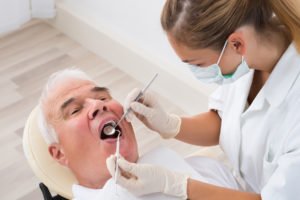Cavities In Adults
 When I was a young kid, I remember trips to the dentists. After my cleaning, I remember the dentist telling me that I had no cavities, at which point the hygienist would walk me over to the “Prize Chest.” It was something I was proud of! No cavities!
When I was a young kid, I remember trips to the dentists. After my cleaning, I remember the dentist telling me that I had no cavities, at which point the hygienist would walk me over to the “Prize Chest.” It was something I was proud of! No cavities!
Typically, we associate cavities with children. Children are definitely prone and susceptible to cavities. However, as we move into adulthood, we enter a second round of cavity-prone years. If you are suddenly getting cavities when you haven’t had them in years (or maybe ever), you may be entering this stage where you are prone to cavities.
What Is A Cavity?
Cavities are what happens when you suffer from tooth decay. When plaque builds up, it dissolves enamel, which creates a hole in your tooth – or, a cavity.
In addition to complications from dry mouth, your gums naturally pull away from your teeth as you get older. Gum disease can also cause your gums to pull away, which exposes the roots of your teeth to plaque.
Older adults often experience decay around the edges of fillings. Seniors often have dental work because their dental habits were subpar when they were kids. Filings can weaken teeth and break, which allows bacteria and plaque to invade the open spaces, causing decay.
One of the primary causes of cavities in adults is dry mouth. Dry mouth is not considered a normal part of aging, but it is a side-effect of more than 500 medications, including those for allergies, asthma, high blood pressure, high cholesterol, pain, anxiety, depress, Parkinson’s and Alzheimer’s.
Recommendations To Help Fight Dry Mouth
It is imperative that you communicate with your dentist, and are honest. Be upfront about your brushing and oral hygiene habits. More importantly, be upfront about medications that you are taking. Not only can your dentist help you relieve your dry mouth symptoms, but they can also help determine if you need to alter your medication or dosage. Drinking water to create salivation can also help reduce your dry mouth.
Your dentist may also prescribe over the counter oral moisturizers, such as a spray or mouthwash. You may also be provided with a fluoride gel or varnish to protect your teeth from cavities.
Cavity Treatment
The severity of your cavity will determine your course of treatment. The most common method is for our dentist to remove the decayed portion of your tooth will a drill. A filling is inserted into the hole. If your tooth is very badly decayed, your dentist will fuse a crown to the remaining part of the tooth.